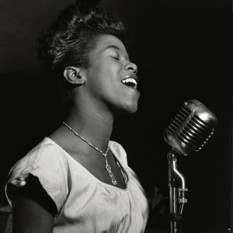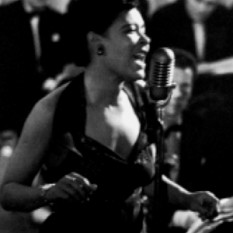Billie Holiday (born Eleanora Fagan April 7, 1915 – July 17, 1959) was an American jazz singer and songwriter. Nicknamed "Lady Day" by her friend and musical partner Lester Young, Holiday was a seminal influence on jazz and pop singing. Her vocal style, strongly inspired by jazz instrumentalists, pioneered a new way of manipulating phrasing and tempo.
Billie Holiday had a difficult childhood. Much information once not considered true was confirmed in the book Billie Holiday by Stuart Nicholson in 1995. Holiday's autobiography, Lady Sings the Blues, which was first published in 1956, is sketchy when it comes to details about her early life, but has been confirmed by the Nicholson research.
Her professional pseudonym was taken from Billie Dove, an actress she admired, and Clarence Holiday, her probable father. At the outset of her career, she spelled her last name Halliday, which was the birth-surname of her father, but eventually changed it to Holiday, his performing name.
Her distinct delivery made Billie Holiday's performances instantly recognizable throughout her career. A master of improvisation, Billie's well-trained ear more than compensated for her lack of music education performance really was.
In 1972, Diana Ross portrayed Holiday in the film Lady Sings the Blues, which is loosely based on the 1956 autobiography of the same name. The film earned Ross a nomination for the Academy Award for Best Actress. She also has been portrayed by Ernestine Jackson in Lady Day at Emerson's Bar and Grill and by Paula Jai Parker in a Season 7 episode of Touched by an Angel entitled "God Bless the Child," the title deriving from a song that she had written and sung.
In 1987, Billie Holiday was posthumously awarded the Grammy Lifetime Achievement Award. In 1993, R&B singer Miki Howard released an album dedicated to Holiday titled Miki Sings Billie: A Tribute To Billie Holiday. The United States Postal Service introduced a Billie Holiday postage stamp in 1994, she ranked #6 on VH1's 100 Greatest Women in Rock n' Roll in 1999, and she was inducted into the Rock and Roll Hall of Fame in 2000. Over the years, there have been many tributes to Billie Holiday, including "The Day Lady Died," a 1959 poem by Frank O'Hara, and "Angel of Harlem," a 1988 release by the group U2. A 1953 Holiday concert in New York is a key feature of the 2009 Arthur Phillips novel The Song is You.
On May 31, 1959, Holiday was taken to Metropolitan Hospital in New York suffering from liver and heart disease. Police officers were stationed at the door to her room. She was arrested for drug possession as she lay dying, and her hospital room was raided by authorities. Holiday remained under police guard at the hospital until she died from cirrhosis of the liver (the result of several years of substance abuse) on July 17, 1959. In the final years of her life, she had been progressively swindled out of her earnings, and she died with $0.70 in the bank and $750 (a tabloid fee) on her person. Her funeral mass was held at St. Paul the Apostle Catholic Church in New York City.
Critic John Bush wrote that she "changed the art of American pop vocals forever."She co-wrote only a few songs, but several of them have become jazz standards, notably "God Bless the Child," "Don't Explain," "Fine and Mellow," and "Lady Sings the Blues." She also became famous for singing jazz standards including "Easy Living," "Good Morning Heartache," and "Strange Fruit."
.
All albums
You can find information through the best music search engine - Muzlan.top 😊All materials on request "Billie Holiday and Her Orchestra" are available on page Billie Holiday and Her Orchestra
Yes of course. You can listen tracks on the page Billie Holiday and Her Orchestra
Yes of course. You can download tracks on the page Billie Holiday and Her Orchestra
This page is found by queries: Billie Holiday and Her Orchestra mp3 download, Billie Holiday and Her Orchestra remix, Billie Holiday and Her Orchestra free download, Billie Holiday and Her Orchestra all mp3, Billie Holiday and Her Orchestra track minus


